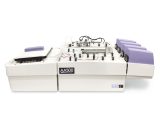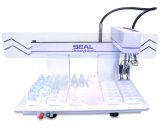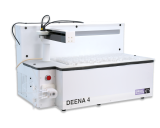Total Phosphorus (TP)
Total Phosphorus testing is essential for monitoring nutrient pollution, optimizing fertilizer use, and meeting regulatory standards. Automating both digestion and analysis improves accuracy, increases throughput, and enables multi-parameter testing in high-demand labs. SEAL Analytical’s advanced analyzers and digestion blocks provide reliable, high-quality solutions for precise Total Phosphorus and Total Kjeldahl Phosphorus analysis.
Why is TP Analysis Important?
Total Phosphorus (TP) analysis is a vital tool for understanding nutrient levels and their impacts across environmental, agricultural, and commercial applications. In environmental testing, TP serves as a key indicator of water quality, helping laboratories monitor nutrient pollution that can lead to eutrophication, harmful algal blooms, and oxygen depletion in rivers, lakes, and coastal ecosystems. Accurate TP analysis ensures compliance with stringent wastewater and industrial discharge regulations, supports source tracking of nutrient pollution, and guides sustainable water management practices.
In agricultural science, Total Phosphorus testing informs soil fertility management, optimizing fertilizer application to maximize crop yields while reducing nutrient runoff into surrounding water systems. By measuring TP in plant tissues and fertilizers, laboratories help farmers achieve precision nutrient management and sustainable agricultural practices. TP analysis is equally critical in commercial applications such as tobacco and fertilizer production, where monitoring phosphorus content ensures product quality, regulatory compliance, and process efficiency.
SEAL Analytical’s automated solutions for Total Phosphorus analysis, including discrete and continuous flow analyzers and robust digestion systems, simplify workflows and ensure reproducible, high-quality results. Following common reference methods such as EPA 351.2, EPA 365.4, and ISO 15681-2, SEAL’s technologies enable laboratories to meet regulatory standards while enhancing throughput and accuracy in nutrient testing. Explore SEAL’s innovative approach to Total Phosphorus automation and learn how we can support your laboratory’s analytical needs.
What's the Automation Advantage?
| 1. Increased Efficiency and Throughput: Automating Total Phosphorus digestion and testing streamlines workflows, enabling laboratories to process larger sample volumes with minimal manual intervention. Automated digestion blocks and nutrient analyzers optimize every step of the process, from digestion to detection, allowing labs to meet tight deadlines and handle high-demand testing environments with ease. | 2. Multi-Parameter Testing on a Single Platform: Both continuous flow analyzers and discrete analyzers are designed to handle multiple analytes, enabling laboratories to perform Total Phosphorus analysis alongside other nutrient tests such as total nitrogen, nitrate, nitrite, ammonia, ortho-phosphate, and more. This multiparameter capability reduces instrument downtime, simplifies workflows, and maximizes the utility of laboratory equipment. | |
| 3. Improved Accuracy and Consistency: Automated systems ensure reproducible results by eliminating the variability associated with manual digestion and testing. Precise temperature controls during digestion and automated reaction preparation deliver consistent conditions for every sample, enhancing both data quality and confidence in results. | 4. Reduced Labor and Operator Dependency: By automating labor-intensive steps such as sample digestion, sample dilution, and system calibration, automation frees analysts to focus on more value-added tasks like data analysis, reagent preparation, and laboratory management. This automated workflow improves overall laboratory productivity and reduces the risk of human error. |
SEAL's Expertise in Automated Total Phosphorus Analysis
With over 60 years of experience in automating environmental and nutrient testing methods, SEAL Analytical has become a global leader in precision laboratory automation. Our roots go back to the pioneering AutoAnalyzer and AutoAnalyzer II, developed by Technicon and later advanced under Bran+Luebbe and SEAL Analytical. This groundbreaking instrument served as the foundation for many of the EPA-approved methods still in use today, including those for Total Phosphorus analysis. Building on this legacy, SEAL’s modern AutoAnalyzers and other product lines combine innovative technology with decades of expertise to deliver unparalleled accuracy and reliability.
SEAL’s success is driven by a team of chemists and leaders with strong scientific backgrounds, ensuring that every product we design addresses real-world laboratory challenges. Our automated digestion blocks and analyzers, including discrete and continuous flow systems, are engineered to streamline Total Phosphorus digestion and analysis while offering the flexibility to handle multiple analytes. With precise temperature control, robust hardware, and scalable workflows, SEAL empowers laboratories to meet regulatory requirements, improve efficiency, and achieve consistent, high-quality results. Whether supporting environmental compliance, agricultural research, or commercial product testing, SEAL Analytical continues to set the standard for automated nutrient analysis.
Key Total Phosphorus Methods and Features
SEAL Analytical’s expertise in Total Phosphorus analysis covers a wide range of approved methods, providing unmatched support for environmental water testing, wastewater analysis, nutrient monitoring, and beyond. Our instrumentation automates methods according to 40 CFR 136 and other regulatory guidelines. Common reference methods for SEAL's Total Phosphorus method library include:
In addition to the analysis of Total Phosphorus, SEAL Analytical offers automated solutions for the digestion and preparation of samples in our line of automated digestion blocks with solutions for both Kjeldahl digestion and persulfate digestion as well as sample pre-dilutions. In-line UV digestion is also available on our continuous flow analyzers.
Some matrices, such as wastewater or soil, may benefit from inline dialysis offered on our continuous flow analyzers, capable of automating consistent, effortless pre-dilution while also providing sample cleanup and removal of interferences and particulates.
Beyond phosphorus detection, SEAL Analytical’s discrete analyzer and continuous flow analyzer product lines support an array of automated processes, including dilution, auto-calibration, automatic QC insertion, and the sequential or simultaneous analysis of multiple parameters. By combining these powerful features with regulatory-approved methods, SEAL Analytical ensures your lab’s phosphorus analysis is not only compliant and efficient, but also capable of delivering consistently precise, high-quality results.
Explore our dedicated page for ortho-Phosphate analysis to discover more available methods and automation from SEAL Analytical.
Compare our Analyzers
Explore the capabilities of each of our product lines below. Our analyzers and robotic systems are capable of analyzing a wide variety of analytes on a single platform. Select a product line to learn more about the capabilities of each system.
Ready to Optimize Your TP Analysis?
Request Information
Fill out the form below to request information about our products and services.


.png?resolution=160x128&quality=95)

